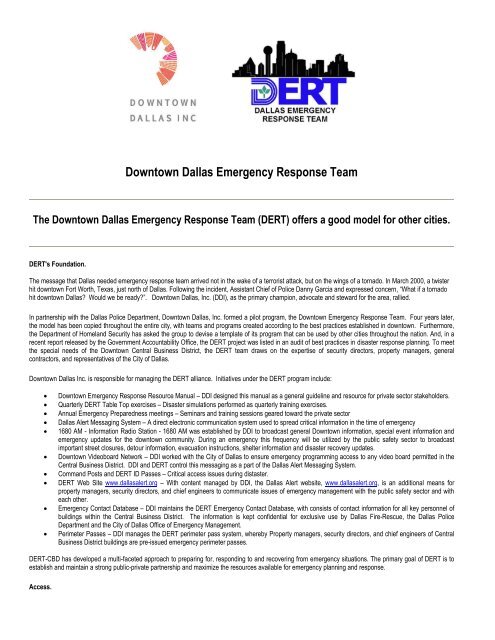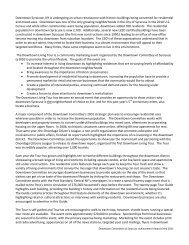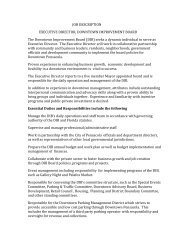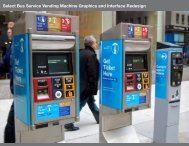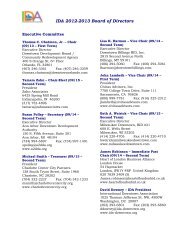Downtown Dallas Emergency Response Team - International ...
Downtown Dallas Emergency Response Team - International ...
Downtown Dallas Emergency Response Team - International ...
You also want an ePaper? Increase the reach of your titles
YUMPU automatically turns print PDFs into web optimized ePapers that Google loves.
<strong>Downtown</strong> <strong>Dallas</strong> <strong>Emergency</strong> <strong>Response</strong> <strong>Team</strong><br />
The <strong>Downtown</strong> <strong>Dallas</strong> <strong>Emergency</strong> <strong>Response</strong> <strong>Team</strong> (DERT) offers a good model for other cities.<br />
DERT's Foundation.<br />
The message that <strong>Dallas</strong> needed emergency response team arrived not in the wake of a terrorist attack, but on the wings of a tornado. In March 2000, a twister<br />
hit downtown Fort Worth, Texas, just north of <strong>Dallas</strong>. Following the incident, Assistant Chief of Police Danny Garcia and expressed concern, “What if a tornado<br />
hit downtown <strong>Dallas</strong>? Would we be ready?”. <strong>Downtown</strong> <strong>Dallas</strong>, Inc. (DDI), as the primary champion, advocate and steward for the area, rallied.<br />
In partnership with the <strong>Dallas</strong> Police Department, <strong>Downtown</strong> <strong>Dallas</strong>, Inc. formed a pilot program, the <strong>Downtown</strong> <strong>Emergency</strong> <strong>Response</strong> <strong>Team</strong>. Four years later,<br />
the model has been copied throughout the entire city, with teams and programs created according to the best practices established in downtown. Furthermore,<br />
the Department of Homeland Security has asked the group to devise a template of its program that can be used by other cities throughout the nation. And, in a<br />
recent report released by the Government Accountability Office, the DERT project was listed in an audit of best practices in disaster response planning. To meet<br />
the special needs of the <strong>Downtown</strong> Central Business District, the DERT team draws on the expertise of security directors, property managers, general<br />
contractors, and representatives of the City of <strong>Dallas</strong>.<br />
<strong>Downtown</strong> <strong>Dallas</strong> Inc. is responsible for managing the DERT alliance. Initiatives under the DERT program include:<br />
<br />
<br />
<br />
<br />
<br />
<br />
<br />
<br />
<br />
<br />
<strong>Downtown</strong> <strong>Emergency</strong> <strong>Response</strong> Resource Manual – DDI designed this manual as a general guideline and resource for private sector stakeholders.<br />
Quarterly DERT Table Top exercises – Disaster simulations performed as quarterly training exercises.<br />
Annual <strong>Emergency</strong> Preparedness meetings – Seminars and training sessions geared toward the private sector<br />
<strong>Dallas</strong> Alert Messaging System – A direct electronic communication system used to spread critical information in the time of emergency<br />
1680 AM - Information Radio Station - 1680 AM was established by DDI to broadcast general <strong>Downtown</strong> information, special event information and<br />
emergency updates for the downtown community. During an emergency this frequency will be utilized by the public safety sector to broadcast<br />
important street closures, detour information, evacuation instructions, shelter information and disaster recovery updates.<br />
<strong>Downtown</strong> Videoboard Network – DDI worked with the City of <strong>Dallas</strong> to ensure emergency programming access to any video board permitted in the<br />
Central Business District. DDI and DERT control this messaging as a part of the <strong>Dallas</strong> Alert Messaging System.<br />
Command Posts and DERT ID Passes – Critical access issues during distaster.<br />
DERT Web Site www.dallasalert.org – With content managed by DDI, the <strong>Dallas</strong> Alert website, www.dallasalert.org, is an additional means for<br />
property managers, security directors, and chief engineers to communicate issues of emergency management with the public safety sector and with<br />
each other.<br />
<strong>Emergency</strong> Contact Database – DDI maintains the DERT <strong>Emergency</strong> Contact Database, with consists of contact information for all key personnel of<br />
buildings within the Central Business District. The information is kept confidential for exclusive use by <strong>Dallas</strong> Fire-Rescue, the <strong>Dallas</strong> Police<br />
Department and the City of <strong>Dallas</strong> Office of <strong>Emergency</strong> Management.<br />
Perimeter Passes – DDI manages the DERT perimeter pass system, whereby Property managers, security directors, and chief engineers of Central<br />
Business District buildings are pre-issued emergency perimeter passes.<br />
DERT-CBD has developed a multi-faceted approach to preparing for, responding to and recovering from emergency situations. The primary goal of DERT is to<br />
establish and maintain a strong public-private partnership and maximize the resources available for emergency planning and response.<br />
Access.
One critical weakness in <strong>Downtown</strong>’s ability to respond to disaster was the ability for private security practitioners to gain access to their company's facilities in<br />
the event of an emergency. To help address this issue, DDI challenged the DERT team to develop an access plan that includes a private sector command post<br />
and pre-issued perimeter passes.<br />
Command post. In an emergency, the <strong>Dallas</strong> Police Department--specifically the Central Business District Police Commander--sets up a mobile command post<br />
to be shared with private sector representatives of the affected property. The command center is set up several blocks away from the epicenter of the disaster<br />
and serves as the nexus of communications during the crisis.<br />
Preissued passes. As part of the plan, certain private sector officials are issued perimeter passes by DERT in advance of any emergencies so that when an<br />
incident occurs, they can use those passes to show that they are authorized to gain entrance. DDI’s Public Safety team issues these passes. Police officers<br />
posted at entrances to affected buildings also call the command post to check the pass number to ensure that it is valid. Command personnel have a computer<br />
database and a print-out of the list of pass numbers and individuals. Under the plan, no one will be allowed in a restricted area in an emergency without a pass.<br />
Cooperation.<br />
DERT is truly a public-private partnership, representing the private building ownership/management community as well as several local, state and federal<br />
agencies. Everyone involved in DERT understands the major importance of developing contacts and relationships to enhance cooperation.<br />
In addition to daily contact among members of the private sector, local law enforcement, and the FBI, these professionals also gather at formal monthly meetings<br />
and share information via e-mail. For example, DDI ensures that the private security professionals in <strong>Dallas</strong> have representation in the EOC (<strong>Emergency</strong><br />
Operations Center) for <strong>Dallas</strong> if disaster should strike.<br />
DERT is also updating the way information is provided to the fire department. Before the incident in Fort Worth, fire officials had only building specification sheets<br />
to work from. Since then, DERT has provided a schematic sheet for each building by working with the private property owners and encouraging them to share<br />
the information with <strong>Dallas</strong> Fire-Rescue.<br />
Training.<br />
The most common and effective training DERT administers involves tabletop exercises and disaster drills. On a quarterly basis, disasters are simulated by the<br />
DERT team, involving every agency and private sector entity. For example, one recent exercise involved a tanker overturning on an icy highway. The fuel ignited<br />
and was rolling toward a major commercial development, a hotel and an elementary school. The scenario occurred during rush hour. More than 100 participants<br />
were involved in the simulation and had to face issues related to a moving hazard, children, flexible staging areas and traffic congestion.<br />
All of DERT’s tools would be utilized during such a disaster. Alerts would be distributed through the AM radio station, video boards and direct electronic<br />
notification system to notify the public about toxin hazards, access points and traffic issues. Access controls and command posts would be used for control and<br />
situation assessment.<br />
Continued Improvement.<br />
As technology changes, so does the ability for us to better respond in the case of emergency and disaster. DERT’s future goals include expanding its<br />
communications system to include a text and voice messaging system that would be able to send to mobile and office phones.<br />
Another goal of the group is to reach out to small businesses in the downtown area. One challenge to the program has been turnover of restaurants, retailers<br />
and other small business owners. However, with the help of merchant associations managed by DDI, outreach to these individuals will be a focus of DERT<br />
growth.<br />
Conclusions.<br />
<strong>Downtown</strong> <strong>Dallas</strong> Stakeholders received 28 <strong>Emergency</strong> Alerts in 2009 regarding threats and incidents affecting <strong>Downtown</strong> <strong>Dallas</strong>. Each year DDI sponsors a<br />
Public Safety Forum, <strong>Emergency</strong> Preparedness Seminar, Building Evacuation Drills, and table top exercises. <strong>Downtown</strong> <strong>Dallas</strong> Stakeholder situational<br />
awareness and emergency preparedness is at an all time high. <strong>Downtown</strong> Property Owners and Building Managers have come to expect the DERT network to<br />
provide real time intelligence and on-going training opportunities to ensure the safety and security of 135,000 <strong>Downtown</strong> tenants, residents, and employees.


